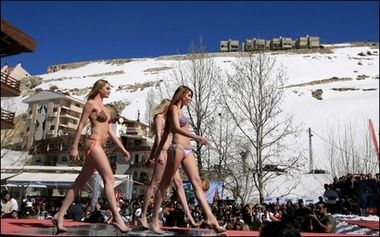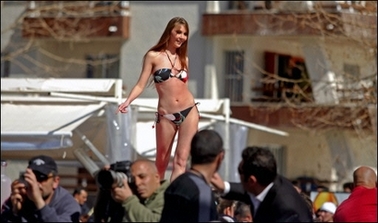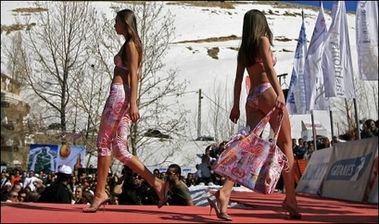 BEIRUT (AFP) – Models in G-strings and lacy bras shivered from the cold as they strutted the catwalk at the foot of snow-covered slopes in Lebanon to promote the conservative Middle East’s largest ski resort. The fashion extravaganza aimed to lure visitors to the country’s six winter resorts whose fortunes have gone downhill since last year’s Israeli offensive, a political and economic crisis — and even inclement weather.
BEIRUT (AFP) – Models in G-strings and lacy bras shivered from the cold as they strutted the catwalk at the foot of snow-covered slopes in Lebanon to promote the conservative Middle East’s largest ski resort. The fashion extravaganza aimed to lure visitors to the country’s six winter resorts whose fortunes have gone downhill since last year’s Israeli offensive, a political and economic crisis — and even inclement weather.
A sea of cameras focused on lingerie-clad models parading on the terrace of the five-star Mzaar Hotel nestling amid the snowy peaks of the Faraya-Mzaar resort northeast of Beirut.The models may have been young eastern Europeans familiar with cold weather, but the scene was purely Lebanese in all of its contrast.
Many Arab states are famous for their deserts, but the tiny mountain country dubbed the Switzerland of the Middle East sports groomed slopes for skiers and snowboarders, as well as scenic cross-country ski and snowshoe trails.
A Lebanese tourism slogan boasts that in springtime aficionados can ski from sun-washed peaks, enjoying breathtaking views of the Mediterranean in the morning — and then swim in the sea the same afternoon.Forgetting for a while the problems that plague the country, Lebanon’s happy few and a small number of tourists sipped drinks and enjoyed gourmet dining on the Mzaar terrace as they watched the daring lingerie show.
Some women onlookers were veiled, but most had full make-up and were in fur coats. Youngsters wore trendy ski gear and most spoke an Arabic sprinkled with French or English words delivered in an astonishingly correct accent.
The apres-ski atmosphere may have been festive, but the slopes were still not attracting the usual weekend crowds who jam the runs and ski lifts.
"We’re down 30 percent this year because of political instability, the economic crisis and even the weather as it snowed during weekends in February" blocking roads and keeping people away, said Nicole Wakim, marketing manager of the Faraya-Mzaar resort.
"We put on special events such as night skiing, ski shows, competitions and fashion shows to promote the resort. We also encourage tourism packages including travel, lodging, skiing, cave explorations and archaeological visits," she told AFP.
"A whole industry has been hit, from companies running the resorts to ski instructors and hotels to the people who rely on the winter months to make a living," she said.
"We hope that next season the situation will be stable. It’s true that the ski resorts are located far from the trouble that happens in the country, but tourists still have to come through the airport and Beirut."
Arab and other foreign tourists have still not returned to Lebanon in real numbers since last year’s military conflict with Israel.
Currently only a few Western diplomats — some from neighbouring Syria — and Lebanon-based UN peacekeepers from Nordic countries can be seen perfecting their skills on the slopes, many of them on the black runs.
One disgruntled ski instructor called Yussef dragged on his cigarette near a ski lift.
"Last year I made more than 4,000 dollars (3,000 euros), but this year I don’t think I will even reach 1,000 dollars," he complained.
Robert Zoghbi, general manager of the Mzaar Intercontinental hotel, said: "We have not achieved the same levels as last year, which was a record for occupancy, income, and in terms of tapping into different markets, segments of Lebanese society and different nationalities."
"Last year, we had 100 percent occupancy in winter," he said.
Zoghbi said the fashion show and other special events at weekends "are meant to say that Lebanon is alive, buzzing and that spirits are up despite the situation."
But not everyone shares his enthusiasm.
"It may sound selfish, but it’s better to have nobody on the slopes," said 22-year-old university student Karim Haddad, leader of a group of snowboarders.
"Nature will be preserved and we will have the slopes all to ourselves."





